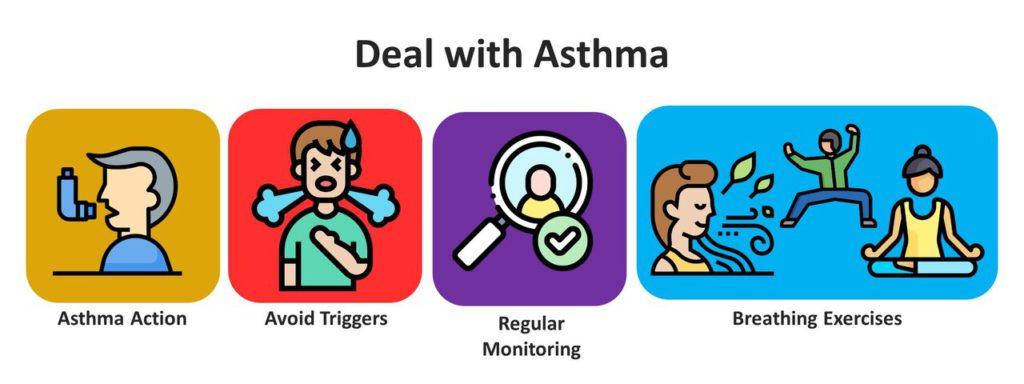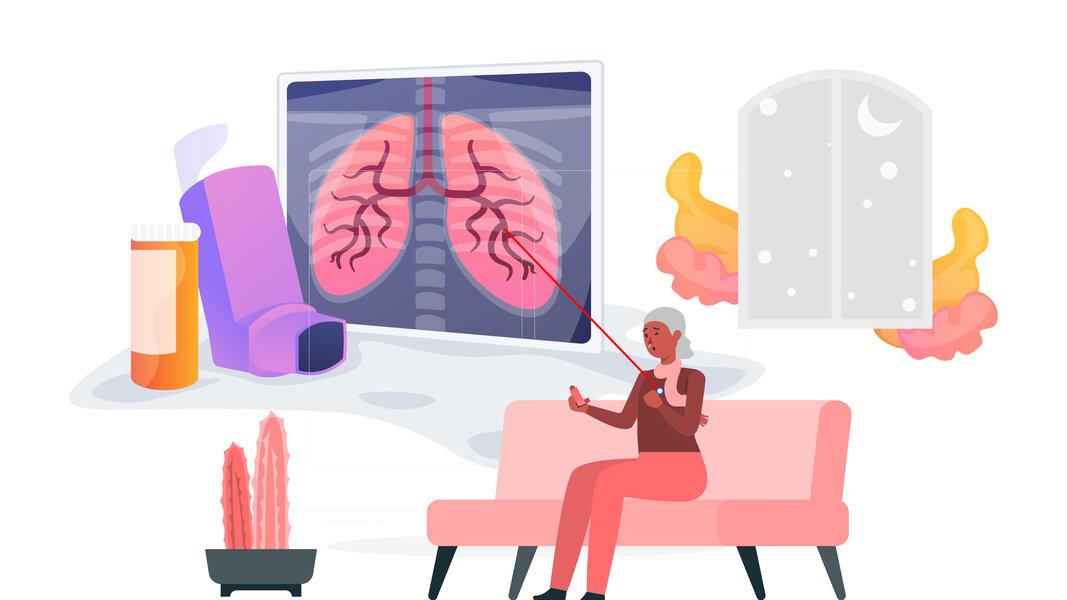Article Contents
Introduction
Breathing issues is not uncommon among young adults. Even children have such problems. It is one of the most concerning and irritating of all medical conditions.
Asthma in seniors is also very common. A high percentage of older adults have minor to severe breathing issues. They often have asthma attacks that lead them to the hospital.
So, it is crucial to take preventive measures to deal with it. This article focuses on exactly that. We will build some general idea about asthma in older adults. And in the end, we will know how to deal with it to lead a fresh-breathing life.
What Is Asthma?
Asthma is a medical condition or disease. It is the obstruction in our airways that causes difficulties in breathing. Different allergies and irritants are responsible for causing the obstruction. As a result, people with asthma feel twitchiness or irritations in the airways.
The stimuli mentioned causes muscle constriction and inflammation. As a result, the airways experience swelling and increase in secretion. Eventually, it leads to coughing and breathing difficulties.
According to the U.S. Department of Health and Human Services Administration on Aging, over 2 million Americans aged 65 or more have asthma. And the American Academy of Allergy, Asthma and Immunology reports that, asthma in elderly is the faster growing medical disease that needs to be treated seriously
During an asthma attack, the lungs get affected. The airways become narrower, and this causes breathing issues. Asthma attacks can be mild to extremely severe. Depending on the severity, you will need to figure out the type of treatment to take.
The most common and preferred way of treatment is using asthma inhaler for elderly. But sometimes, taking immediate precautions can help you as well. We will look into the immediate preventive measures later on.
How Is Asthma Different in Older Adults?
Most people will start experiencing asthma issues at a young age. But asthma and aging have a special connection. People can develop breathing issues at any age. And it can get severe at an older age. Sometimes, there can be some genetic cause of asthma as well. According to studies, genetics accounts for almost 70% of the risk of developing asthma.
So, the question is- can asthma develop in old age? Well, it is certainly not an uncommon sight. Older adults at the age of 70 to 80 can develop asthma symptoms. The symptoms are quite similar to people of any age.
So, can older adults develop asthma? They certainly can, but with different causes and severe issues. For example, older adults can develop asthma due to pollution, lung deterioration, heart diseases and viral attacks. As a result, the symptoms can be life-threatening as well.
Mild asthma in older adults can have similar symptoms to severe asthma in young adults.
Older adults have asthma attacks that can lead to serious and disabling diseases.
DID YOU KNOW?
Can Childhood Asthma Return in Seniors?
As I write this article, I imagine those childhood days when I used to have asthma attacks. It’s all good now as I’ve recovered. But I can’t stop thinking- can childhood asthma return in seniors?
Even if you have a long period of no symptoms, childhood asthma can come back. But the good news is that it might just be occasional things. For example, you can have breathing problems at work. It is known as Occupational Asthma.
Yet, it’s important to know the asthma onset in seniors. Is it a late onset of asthma? Or is it something that was there before and came back again. Childhood asthma can be the cause of allergic reactions. On the other hand, late-onset asthma can be harder to treat.
What Are the Causes of Asthma in Seniors?
Asthma in seniors is a serious issue. So, preventing it is as important. But before that, you need to know the causes of asthma. So, what causes asthma in older adults?
Asthma has many causes behind it and possibly no cure at all. You can deal with it with some preventive measures. Knowing the causes will definitely help. Here are some causes of asthma in seniors:
- Different allergies can trigger asthma. Allergies can lead to sneezing, coughing, wheezing and itching. These common allergies can be the primary cause of asthma.
- Some seniors also have food allergies that can lead to asthma. Eating those foods can trigger breathing issues.
- Do you feel shortness of breath after exercising? This can be another cause of asthma, especially among inactive seniors.
- More than 75% people with asthma has Gastroesophageal Reflux Disease (GERD). This is another major cause of asthma.
- Smoking and drug abuse are primary causes of asthma among young adults. But it can undoubtedly lead to asthma in seniors as well.
- Respiratory infections can also lead to asthma. They affect the lungs and airways to cause severe breathing issues.
- Current asthma drugs aren’t working to reduce swelling. Thus, you can feel shortness of breath even after using them.
- Finally, eosinophil can also trigger asthma. It is a type of white blood cell in our body. Many drugs may not determine this cause of asthma.
Asthma Symptoms in Seniors
The asthma symptoms in seniors can include quite a few. Some can lead to warning signs and last for the rest of your life. Some common symptoms of asthma in seniors are:
- Wheezing or coughing
- Coughing with sputum
- Shortness of breath
- Breathing complications
- Tightness in the chest
A mild asthma attack can include any of the above symptoms. And it can last several minutes too. But a severe attack may include all the symptoms in the list. And it will also last longer.
Warning Signs of Asthma
Recognizing the warning signs of asthma can help you recover quickly. You will need to be careful about them. These signs will need immediate medical treatment. So what are the signs of asthma? They are as follows:
- Frequent asthma symptoms with day-to-day activities
- Using inhaler more than often
- Symptoms not letting you sleep at night
And then there are some risks that can lead to cardiac attacks and possible death. Those risks include:
- Uncontrolled asthma attacks
- Asthma treatment plan not working at all
- Hospitalization from severe asthma attacks
- Being in a ventilatory support from asthma attacks
– breathing issue worsens
– inhaler doesn’t work
– breathing difficulties don’t allow you to speak properly
– lips turning gray or blue
Seek emergency support when:
Why Is Asthma Difficult to Diagnose in Seniors?
Asthma treatment in seniors can sometimes be difficult. This is because they have other underlying health concerns. The symptoms of those medical conditions can be similar to asthma symptoms. As a result, it gets difficult to diagnose asthma in seniors.
The most common asthma symptom in seniors is coughing with sputum. Sputum is the fluid that comes out with cough. A doctor may interpret this symptom as a cause of other illness. For example, chronic bronchitis or heart failure can have the same symptoms.
[Keynote: doctors can recognize asthma in young adults from breathing issues after exercise. But seniors get inactive in their older ages. As a result, it becomes difficult to recognize the symptoms. Thus, you should consult your doctor when you feel wheezing, chronic cough and breathing shortness during regular activities of daily living (ADLs).
5 Things to Do Immediately After an Asthma Attack
Asthma in older adults is too common of a disease these days. The climate changes, weather toxicity, and coronavirus outbreak play major roles in it. Thus, having an inhaler for seniors can be of great help.
But what happens when you don’t have one to your nearest? You can consider doing several things immediately after an asthma attack. Here are 5 things to do before medical help arrives:
1. Sit up straight
Almost everyone will consider lying down during an asthma attack. This is NOT the right thing to do. You would want to give the lungs proper airflow. Lying doesn’t help with that.
So, your first task would be to sit up and straight as an arrow. This will help keep the airways open. As a result, the symptoms will slowly wear off.
2. Stay calm and composed
Panicking can deteriorate the situation even more. Even if you aren’t having a sever attack, panicking can increase the negative effects. Thus, you will need to calm yourself down and not stress at all.
There are a few things you can do to calm your mind. For starters, you can turn the TV on and watch a comedy show. Or you can play your favorite songs to calm yourself down.
3. Slow and steady breathing
When you have asthma attacks, try to calm yourself first. And then, take slow breathes. There are 3 techniques you can follow for this process.
- The first technique is the Buteyko Breathing Technique. This technique involves breathing slowly through your nose instead of your mouth.
- The second technique is the Papworth Method. In this method, you will need to use your nose and diaphragm to breathe in particular ways.
- And the last technique is the Yoga Breathing technique or Tai Chi. Follow this link to find out more about the technique.
These breathing exercises can also improve asthma symptoms among seniors.
4. Stay away from triggers
Asthma is not only a simple lung airflow deterioration. Different kinds of triggers can also worsen the symptoms. Your next task is to keep them away from you during asthma attacks.
The most common trigger is cigarettes and smoking areas. You should immediately move away from such an environment. Here are some more common triggers of asthma attacks:
- Different allergens like pollen, dust mites, molds, and pet dander
- Irritants like air pollution, cleaning, and tobacco
- Exercises that are too intense like running, swimming, or that involve cold weather such as skiing, ice hockey
- Stress of anxiety
- Some medications like aspirin or ibuprofen
- Respiratory infections like cold or flu
- Cold or dry air
5. Call 911
The final act is to call for immediate medical support. You might be experiencing any severe symptoms during the asthma attack. So, it’s a must to call 911 as soon as possible.

How to Deal with Asthma in Seniors?
Dealing with asthma in seniors involves taking preventive measures. You might already have figured out that there is no definitive cure of asthma in seniors. So, prevention is the best cure of it. Here are 4 ways you can ensure the best prevention care plan:
1. The asthma action plan
Developing an asthma action plan is key to preventing asthma in seniors. Work with your doctor for this process. This will help you to keep asthma under control.
So, how does an asthma action plan work? The plan includes several things like medications, treatment timings, asthma attack responsibilities and doctor checkups.
It is crucial to follow the plan thoroughly. Never miss any medicines during the treatment process. And always remember to follow up with your doctor in a timely manner.
2. Avoid the triggers
When you have asthma, you need to be in a balanced lifestyle. This involves avoiding any trigger that enhances the breathing issues. Some triggers you can avoid are as follows:
- Pollution
- Smoke
- Allergies
- Cold weather
- Heavy exercise
- Irritants
- Allergic foods
3. Condition monitoring
It is crucial to checkup with your doctor every now and then. Even if you don’t feel any problem, make appointments to visit your doctor. A simple change can cause great effects. And you will need to tell your doctor about it. And sometimes, your asthma action plan may even need updates.
4. Breathing exercises
We have already talked about this in the previous section. But we’re repeating this to make you understand their importance. There are as much as 3 breathing exercises you can do. If you need an assisted living advisor for this, reach out to us in our website.
Conclusion
Asthma in senior citizens is a concerning issue. So, dealing with it is absolutely crucial. The worst thing is that there might not be any direct cure of asthma. But we can always take preventive measures to lead a healthy breathing life.
The best preventive measure is maintaining an asthma action plan. This plan includes all the necessary medications, doctor checkups, breathing exercises and immediate to-dos of asthma attacks. It is always best to consult with your physician in developing the perfect asthma action plan.

